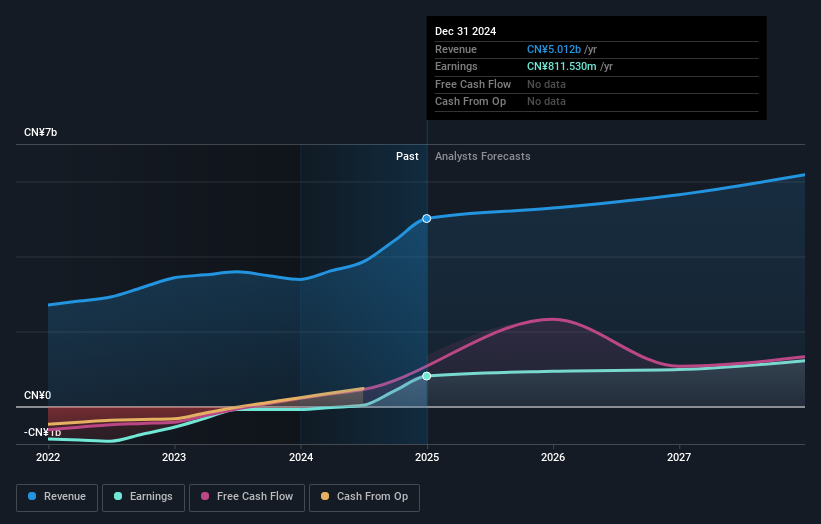
Key Insights
- The considerable ownership by retail investors in XD indicates that they collectively have a greater say in management and business strategy
- The top 5 shareholders own 50% of the company
- Insiders own 45% of XD
A look at the shareholders of XD Inc. (HKG:2400) can tell us which group is most powerful. We can see that retail investors own the lion's share in the company with 45% ownership. Put another way, the group faces the maximum upside potential (or downside risk).
Retail investors gained the most after market cap touched HK$16b last week, while insiders who own 45% also benefitted.
In the chart below, we zoom in on the different ownership groups of XD.
Check out our latest analysis for XD

What Does The Institutional Ownership Tell Us About XD?
Institutions typically measure themselves against a benchmark when reporting to their own investors, so they often become more enthusiastic about a stock once it's included in a major index. We would expect most companies to have some institutions on the register, especially if they are growing.
As you can see, institutional investors have a fair amount of stake in XD. This can indicate that the company has a certain degree of credibility in the investment community. However, it is best to be wary of relying on the supposed validation that comes with institutional investors. They too, get it wrong sometimes. It is not uncommon to see a big share price drop if two large institutional investors try to sell out of a stock at the same time. So it is worth checking the past earnings trajectory of XD, (below). Of course, keep in mind that there are other factors to consider, too.

Hedge funds don't have many shares in XD. Looking at our data, we can see that the largest shareholder is the CEO Yimeng Huang with 34% of shares outstanding. In comparison, the second and third largest shareholders hold about 11% and 2.2% of the stock. Interestingly, the second-largest shareholder, Yunjie Dai is also President, again, pointing towards strong insider ownership amongst the company's top shareholders.
Our research also brought to light the fact that roughly 50% of the company is controlled by the top 5 shareholders suggesting that these owners wield significant influence on the business.
Researching institutional ownership is a good way to gauge and filter a stock's expected performance. The same can be achieved by studying analyst sentiments. There are a reasonable number of analysts covering the stock, so it might be useful to find out their aggregate view on the future.
Insider Ownership Of XD
While the precise definition of an insider can be subjective, almost everyone considers board members to be insiders. Company management run the business, but the CEO will answer to the board, even if he or she is a member of it.
Insider ownership is positive when it signals leadership are thinking like the true owners of the company. However, high insider ownership can also give immense power to a small group within the company. This can be negative in some circumstances.
Our information suggests that insiders maintain a significant holding in XD Inc.. It has a market capitalization of just HK$16b, and insiders have HK$7.2b worth of shares in their own names. That's quite significant. Most would be pleased to see the board is investing alongside them. You may wish to access this free chart showing recent trading by insiders.
General Public Ownership
With a 45% ownership, the general public, mostly comprising of individual investors, have some degree of sway over XD. While this size of ownership may not be enough to sway a policy decision in their favour, they can still make a collective impact on company policies.
Next Steps:
While it is well worth considering the different groups that own a company, there are other factors that are even more important.
Many find it useful to take an in depth look at how a company has performed in the past. You can access this detailed graph of past earnings, revenue and cash flow.
If you would prefer discover what analysts are predicting in terms of future growth, do not miss this free report on analyst forecasts.
NB: Figures in this article are calculated using data from the last twelve months, which refer to the 12-month period ending on the last date of the month the financial statement is dated. This may not be consistent with full year annual report figures.
Have feedback on this article? Concerned about the content? Get in touch with us directly. Alternatively, email editorial-team (at) simplywallst.com.
This article by Simply Wall St is general in nature. We provide commentary based on historical data and analyst forecasts only using an unbiased methodology and our articles are not intended to be financial advice. It does not constitute a recommendation to buy or sell any stock, and does not take account of your objectives, or your financial situation. We aim to bring you long-term focused analysis driven by fundamental data. Note that our analysis may not factor in the latest price-sensitive company announcements or qualitative material. Simply Wall St has no position in any stocks mentioned.